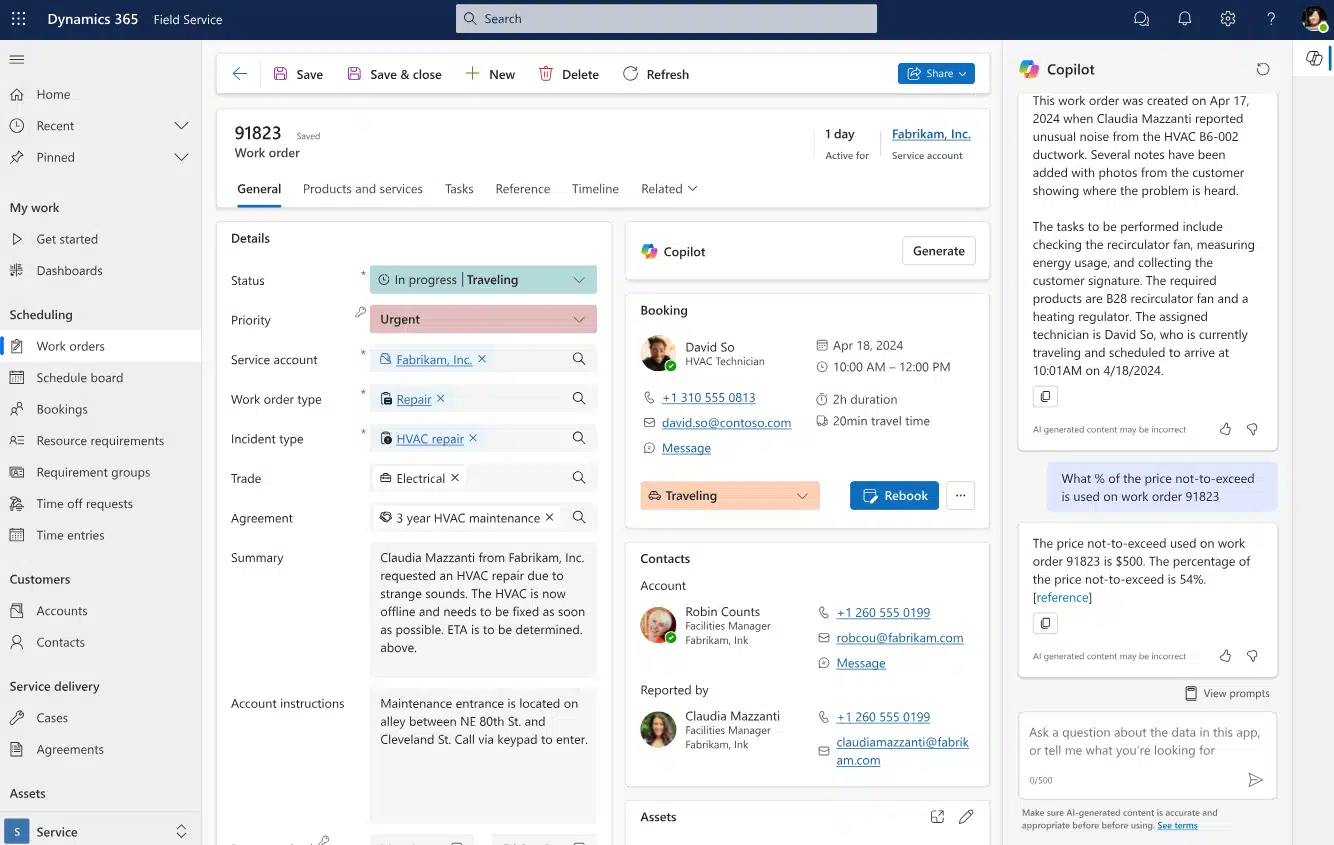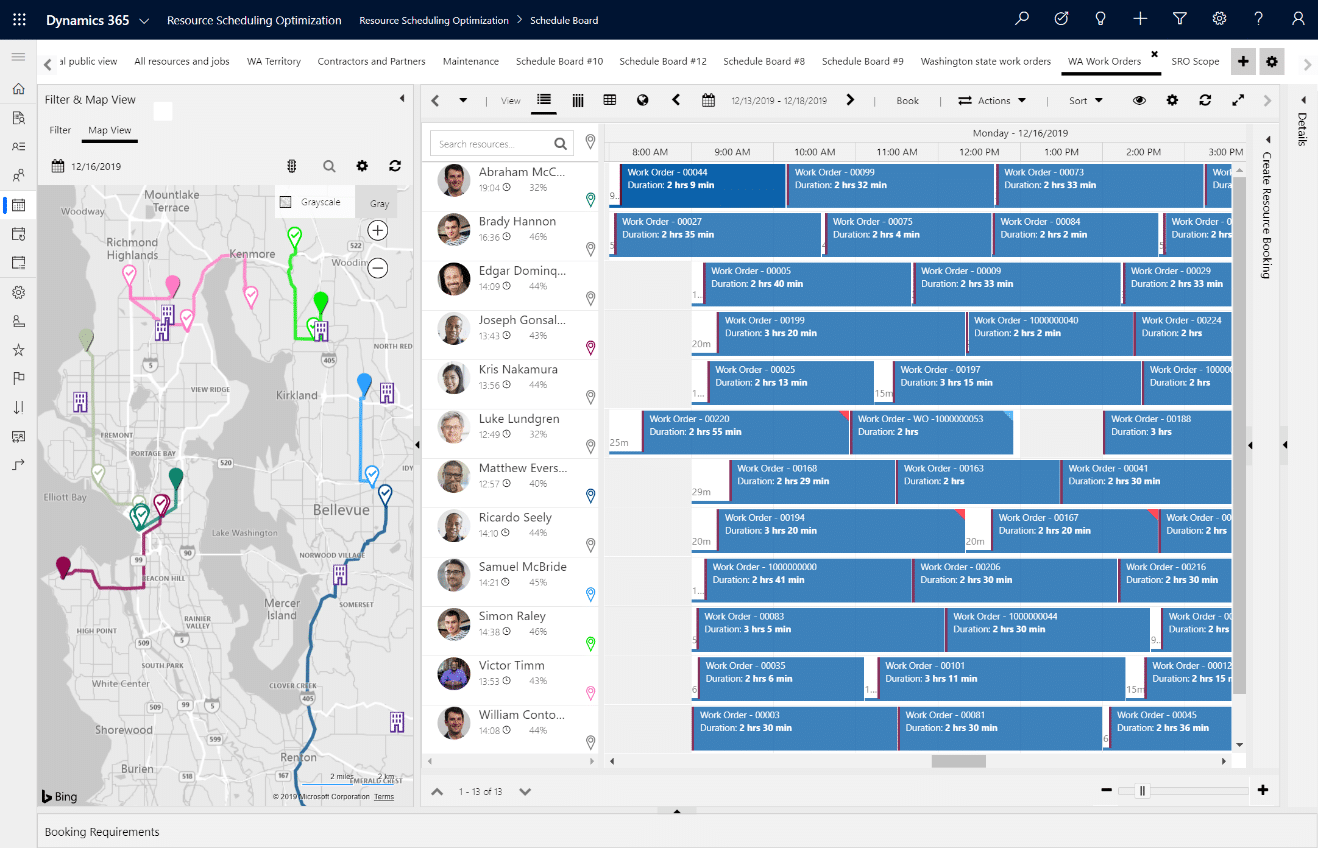Understanding Dynamics 365 Field Service pricing

Dynamics 365 Field Service is Microsoft’s cloud-based field service management solution. It helps organizations manage onsite service operations with tools for work order scheduling, dispatching technicians, inventory tracking, and proactive maintenance using IoT and AI. In this guide, we’ll break down how D365 Field Service is priced, what costs to consider beyond licensing, and best practices to optimize your investment.
- What is Dynamics 365 Field Service?
- How is Dynamics 365 Field Service licensed?
- How is Dynamics 365 Field Service priced?
- Resource Scheduling Optimization add-on
- Integration and implementation costs
- D365 Field Service Total cost of ownership (TCO)
- How to purchase Dynamics 365 Field Service
- Licensing tips and best practices
- Dynamics 365 Field Service pricing FAQs
What is Dynamics 365 Field Service?
Dynamics 365 Field Service is a comprehensive application for managing field service operations. It connects customer service and dispatch teams with field technicians through a unified platform. Key features include work order management, scheduling and route optimization, asset management, and a mobile app for field technicians. The solution leverages IoT sensors and AI-driven analytics to enable proactive service, for example, detecting equipment issues remotely and scheduling maintenance before a failure occurs. It also supports mixed reality tools (like Microsoft Dynamics 365 Guides and Remote Assist) to provide technicians with real-time guidance during repairs. In short, D365 Field Service helps organizations streamline scheduling, improve first-time fix rates, and enhance customer experiences by ensuring the right technician is dispatched to the right place at the right time.

See Dynamics 365 Field Service in action
See how Dynamics 365 Field Service improves technician efficiency, simplifies scheduling, and helps teams deliver better service. Schedule a demo today.
How is Dynamics 365 Field Service licensed?
D365 Field Service uses a per-user, subscription-based licensing model. Each individual accessing the system must have their own assigned license. Licenses are not shared or pooled as they are tied to named users. If someone leaves your organization, their license can be reassigned, but it cannot be passed back and forth between multiple people.
Microsoft offers three subscription term options. These terms provide different levels of flexibility and pricing:
- Monthly term: This option gives you the ability to scale licenses up or down with minimal restrictions. It’s suited for organizations with fluctuating staffing needs or seasonal workers. The tradeoff is cost, as monthly licenses usually carry a premium of around 20% over longer-term options.
- Annual term: Most small and mid-sized businesses choose the annual term. It provides stable pricing and allows you to pay monthly or upfront. During the 12-month term, you can add users at any time at a prorated cost, but removing or downgrading licenses usually must wait until renewal.
- Multi-year term: For businesses seeking budget predictability, Microsoft also supports longer commitments, typically over three years. These agreements lock in your pricing for the full term, protecting you from announced increases. While less flexible, they offer long-term savings and cost stability.
Regardless of the term, each license is allocated to a specific person. There’s no concept of concurrent user licensing with D365 Field Service, so if 12 employees need access, you need 12 licenses. You’ll choose from the available license types of D365 Field Service, D365 Field Service Contractor, Team Members, or Device and select the appropriate subscription term based on your budget and staffing plans.
How is Dynamics 365 Field Service priced?
Dynamics 365 Field Service uses a subscription licensing model, priced per user per month with annual billing options. This means you pay a fixed fee for each named user who will access the system. There is no minimum number of licenses required so you can start with a single user and scale up as needed, making it flexible for organizations of any size.
There are two primary user license types for Dynamics 365 Field Service (D365 Field Service and D365 Field Service Contractor), plus two light-use licenses called Team Members and Device.
- Dynamics 365 Field Service license: $105 per user per month. This full-user license provides access to all D365 Field Service capabilities, including work order management, scheduling/dispatch, inventory tracking, the mobile app, and integration with other Dynamics 365 apps. This license also grants access to Dynamics 365 Remote Assist and Dynamics 365 Guides for mixed-reality support.
- Dynamics 365 Field Service Contractor license: $50 per user per month. This license is intended for non-employees or occasional field agents who need access to execute work orders and update their status, but who don’t require the full functionality of a regular internal user. The Contractor license provides core field service capabilities with some limitations on advanced features. Certain high-end functionalities may be limited under this license.
- Team Member license: $8 per user per month. For supporting staff or users who only need very lightweight access to D365 Field Service data. The Team Member license is significantly lower in cost and is ideal for team members who only need to perform light tasks or consume information.
- Device license: $160 per device per month. A device shared by multiple users, such as point of sale, shop floor, and warehouse devices. Any number of users can access a licensed device with individual logins without the need for separate user licenses.
Microsoft also offers secondary license types for users with limited roles or those who access the system via shared workstations.

Get the complete Dynamics 365 Field Service pricing guide
Want the full pricing breakdown? Download our comprehensive guide for license types, cost scenarios, and tips to reduce your total spend on D365 Field Service.
Resource Scheduling Optimization add-in
Resource Scheduling Optimization (RSO) is a paid add-in for Dynamics 365 Field Service that automatically schedules multiple jobs at once based on key factors like travel time, technician availability, required skills, and job priority. It eliminates the need for manual scheduling by intelligently assigning the right resources to the right jobs, helping dispatchers manage more work in less time. RSO runs on a configurable schedule or on demand, making it suitable for dynamic service operations. Pricing is $30 per full user or device per month.
Key benefits and use cases include:
- Reduce technician travel time with optimized routes
- Improve efficiency by matching jobs to technician skills and availability
- Scale operations by enabling dispatchers to manage more resources
- Enhance customer satisfaction with more accurate arrival times and faster responses
- Fit more appointments into the workday to increase revenue and reduce overtime
- Support overnight scheduling of jobs for the next day
- Run intraday optimizations to adjust schedules as new jobs are added or canceled
- Handle emergency scheduling to prioritize high-urgency work
- Simulate different scheduling scenarios for resource planning
- Optimize the schedule for individual technicians when needed
Integration and implementation costs
In addition to the monthly subscription fees for Dynamics 365 Field Service, it’s important to budget for the one-time costs associated with implementing the system. These upfront costs typically include initial system configuration, data migration from legacy systems, integration with existing software or ERP systems, customization to align with your business processes, and user training. Implementation services are usually provided by certified Microsoft partners or consultants who have expertise in Dynamics 365 Field Service deployments.
How much does a Dynamics 365 Field Service implementation cost? A Dynamics 365 Field Service implementation typically ranges between $25,000 and $250,000+, depending on the complexities of your business. Key factors that influence integration and implementation costs include:
- Number of users and their roles
- Complexity of required customizations and integrations
- Scope of data migration and data cleanliness
- Level of training and change management needed
- Integration with IoT and advanced scheduling tools such as Resource Scheduling Optimization (RSO)
While it’s possible to find partners offering cheaper Dynamics 365 Field Service implementations, those options often depend heavily on offshore teams. Frequently, these resources lack familiarity with U.S. business standards, regulatory compliance requirements, and industry-specific best practices. Communication can suffer as well, since language barriers, significant time-zone differences, and cultural nuances often result in misunderstandings or delays.
Many organizations that opt for low-cost implementations ultimately end up with systems that fail to meet their operational requirements. Others encounter serious deployment issues requiring expensive remediation or even complete redeployment. Fixing a failed implementation can easily cost double the initial investment required to get it right from the outset. Investing in a well-planned, professionally executed Dynamics 365 Field Service implementation, aligned specifically with your business requirements, is ultimately more cost-effective and reliable over time.
D365 Field Service Total cost of ownership (TCO)
When evaluating Dynamics 365 Field Service, it’s essential to look beyond just the monthly or annual licensing fees. Total cost of ownership (TCO) provides a comprehensive view, capturing not only direct licensing costs but also the one-time implementation, recurring support, and indirect expenses associated with operating the system. Understanding the full TCO allows businesses to create accurate budgets and ensure that the investment aligns with their long-term operational and financial goals.
Dynamics 365 Field Service’s cloud-based software-as-a-service (SaaS) model offers a significantly lower TCO compared to traditional on-premises field service management systems. With legacy or on-premises solutions, businesses must handle the expenses of purchasing, maintaining, and eventually upgrading physical hardware and servers. Factor in additional costs for backup systems, network infrastructure, security measures, and a dedicated IT team to manage these elements, and total expenses quickly escalate far beyond software licenses alone.
In contrast, Dynamics 365 Field Service operates entirely in the cloud. Microsoft manages all aspects of system hosting, ongoing maintenance, automatic updates, security patching, and infrastructure reliability. Organizations do not need dedicated data centers, extensive IT staff, database specialists, or separate contracts for backups and monitoring. This cloud model significantly reduces infrastructure costs, simplifies IT operations, and makes long-term budgeting predictable and transparent.

Upfront Licensing Cost
On-premises software has high upfront cost for purchasing the software
Infrastructure Investments
Requires significant investment in hardware, servers, networking, and infrastructure
SQL Server Licenses
Additional cost for SQL Server licenses for on-premises deployment
Database Maintenance
Ongoing costs for database management and updates
Annual Maintenance Fees
Annual fee for maintaining the software
Costly Upgrades
High costs and time investment for upgrading the solution
Monthly Subscription Cost
Monthly cost for the software that encompasses license subscription, upgrades, and maintenance
How to purchase Dynamics 365 Field Service
Microsoft sells Dynamics 365 Field Service through its certified partner network. These partners are authorized to license the software, configure and deploy it, and provide ongoing support.
Certified Microsoft partners offer more than just access to licenses. They help you assess your business needs, recommend the right mix of license types, and ensure your environment is configured for performance, compliance, and scale. A qualified partner can also assist with data migration, systems integration, training, and user adoption. Choosing the right partner is just as important as choosing the right software. The implementation team will shape how the system is configured, how quickly your users can get up to speed, and how well the solution supports your business over time.
Rand Group is a Microsoft partner with over 20 years of experience delivering business solutions across ERP, CRM, and field service. Our team focuses on aligning Dynamics 365 Field Service with your operational goals, ensuring every implementation is tailored to meet real business requirements.
Ready to explore Dynamics 365 Field Service? Contact us today to get started.

Get Dynamics 365 Field Service
Ready to streamline your field operations? From license selection to full deployment, we help you implement Dynamics 365 Field Service the right way from the start.
Licensing tips and best practices
Strategic licensing can save money. Here are some recommendations:
- Mix license types to match user roles: Not every user needs a full $105 license. Use full licenses for technicians and dispatchers, contractor licenses for third-party workers, and Team Member licenses for light users.
- Use attach licenses for multi-app users: If a user already has a D365 app like D365 Sales or D365 Customer Service, D365 Field Service can be added for $20 with an attach license. This approach avoids paying full price twice for the same user.
- Monitor usage and reassign licenses: Use admin reports to track license usage and reassign inactive licenses. This keeps costs down and ensures you’re not overpaying for unused capacity.
- Stay informed on licensing updates: Licensing options and pricing change over time, such as the addition of Contractor licenses in 2024. Review Microsoft’s licensing guide regularly or work with a partner to stay up to date.
- Work with a qualified Microsoft partner: An experienced D365 Field Service partner can help you navigate licensing rules, optimize your license mix, and avoid common pitfalls. They’ll also provide guidance on compliance, configuration, and cost-effective scaling as your business grows.
Dynamics 365 Field Service pricing FAQs
Below are answers to common questions businesses ask when evaluating D365 Field Service pricing:
- How much does Dynamics 365 Field Service cost per user?
The full user license is $105 per user, per month, and includes access to all standard features. Attach licenses are $20 for users who already have another D365 base app, with contractor and team member licenses available at $50 and $8, respectively. - What’s the difference between the Field Service Contractor license and a regular license?
The Contractor license is $50 per user and is intended for third-party technicians who need limited access. At least one full D365 Field Service license is required in your tenant to use contractor licenses. - Can multiple people share one Field Service license?
User licenses are assigned to named individuals and cannot be shared. If multiple people use the same physical device, a $160 per-device license may be more appropriate. - How do I buy D365 Field Service?
D365 Field Service is sold through Microsoft-certified partners. These partners handle licensing, implementation, and ongoing support, and will tailor the solution to your specific business needs. - Is there special pricing for non-profit or educational organizations?
Yes. Microsoft offers discounted pricing for eligible non-profit and educational institutions. Contact a Microsoft partner to learn more and confirm your eligibility.
Next steps
Dynamics 365 Field Service delivers real business value when configured and supported by the right team. With cloud flexibility, proactive tools like AI and IoT, and a licensing model that scales with your business, it’s a smart investment for service organizations looking to improve efficiency and results.
Rand Group has over two decades of experience in business systems and field service transformations. Contact us today to learn more.




